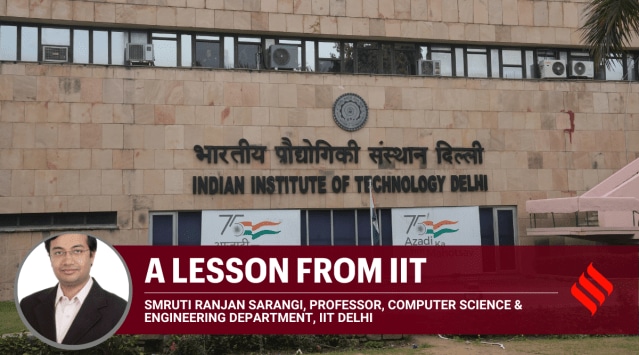Life After IIT: Unemployed at 40 or employed till 80? IIT Delhi professor shares insights
"In so-called sunrise sectors like my branch, Computer Science, or Electronics Engineering ... finding someone above 40 (years) in top companies in India is a rare sight (going by my experience). A lot of my colleagues and co-travelers in my professional journey are unemployed as of today .. so to be employed till 80, one needs to ignore short-term gains and focus on long-term benefits," writes IIT-Delhi Professor Smruti Rajan Sarangi.
 The IIT Delhi professor shares how we are a richer society now and we don't have to follow the pattern of 2000s.
The IIT Delhi professor shares how we are a richer society now and we don't have to follow the pattern of 2000s. (A Lesson from IIT is a weekly column by an IIT faculty member on learning, science and technology on campus and beyond. The column appears every Friday)
— Smruti Rajan Sarangi
Let me go back to the day that I got my IIT JEE result. The moment my father told me my rank on the phone, my branch was decided: Computer Science (CS). It is something that I had earned with years of hard work. Whether I was actually interested in CS or whether it had great career prospects in India was not something that required to be debated. The method of choosing a university in the US for doing a PhD followed the same method – do what others are doing. In fact, after my PhD, I don’t seem to have gained any great wisdom and I again joined the private sector based on the perceived rank of companies.
If I think back, we all do this. In fact, psychologists have a name for this phenomenon, “the mimetic theory of desire.” It basically says that a man does not know what to desire, he instead, decides to highly value what others consider desirable. In poorer societies like ours, mimesis or imitation is much stronger than richer societies where individuals can make more independent choices.
The key question that arises is whether a different set of choices would have led to a better outcome? Would I have been happier today if let’s say I would have done a B.Tech in Civil Engineering? That is a counterfactual question, which is impossible to answer unless some day technology is developed to rewind one’s life. Nevertheless, there are a couple of things that I should have known and considered, which were unknown to me and my social circle when these decisions were being made. These are things that one realises with age and experience. LinkedIn also helps create a better world view, because it nicely shows the correlation between someone’s position in life today and the choices that she made 20 years ago.
The biggest lesson that I have learnt is that no branch is good and no branch is bad. The wearer knows where the shoe pinches. For those who feel that Computer Science is the ultimate nirvana, let me highlight a couple of things. In this field, there are no transportation costs or manufacturing costs, which basically means that one company in the Silicon valley can make a product, which the entire world can use. Because of the internet, there is no notion of distance. Even though this makes the life of the consumer great, the sad part is that for almost every product there will only be one or two vendors. You will have one or two search engines, one or two operating systems, one or two word processors, so and so forth. This automatically implies that there will be a small set of engineers who will do the core work, and the rest will be delegated to bug fixing and support-oriented roles.
This is referred to as the “pyramid effect”. Right after college, students will find good roles in multinational companies. Gradually opportunities will shrink, and they need to move closer and closer to the center of gravity, which may be somewhere in the US or in east Asia such as Taiwan or South Korea. There is a pyramid effect in time also. If 10 employees report to a manager, 10 managers report to a senior manager, so on and so forth, then everybody cannot expect to be promoted. This means that people will either switch companies or gradually get displaced by younger and more hard-working colleagues. In India, people quite vociferously demand increments, which leads to unsustainably high salaries; this hastens the process of falling off the pyramid.
The sum total is that in so-called sunrise sectors like my branch, CS, or Electronics Engineering, falling off the pyramid is common. In fact, finding someone above 40 in top companies in India is a rare sight (going by my experience). A lot of my colleagues and co-travelers in my professional journey are unemployed as of today because of this phenomenon. In fact, I would argue that this is a serious problem, which sadly the media does not talk about and many in the “Bharat part of India” are simply not aware of. We cannot deny the fact that to lead a good life in today’s India with malls and multiplexes, a continuous source of income is needed. Moreover, employment is also needed to give life a sense of purpose.
The question that begs for an answer now is what one can do to not fall off the pyramid or alternatively make a soft landing and quickly climb up another pyramid. We come to my second learning, which is that to be employed till 80, one needs to ignore short-term gains and focus on long-term benefits. Unless one is thoroughly interested in what she is doing, she will not find the motivation to work 8 hours a day, 5 days a week and at least 50 weeks a year from the age of 22 till let’s say 70 or 75. This basically means that regardless of the branch, people have to focus on developing strong fundamentals and really enjoying the subject. They should focus on advanced degrees and create deep skills.
Let’s now come to the third learning, which is developing the personal aspect. Life has its ups and downs and regardless of the industry – software to cement – downturns will happen. This is where the depth of character, interest in music, films and books, and strong interpersonal relationships with friends and family prove to be a life saver.
Unless we invest in all of these softer aspects of life, it will be hard to navigate the downs of life, and we are bound to overreact to situations, which will be “penny wise and pound foolish” decisions. To summarise, India of 2023 is not the same as India of 2000; we are richer and far more secure. I thus don’t see any reason for the current generation to repeat the same kind of mistakes that people of my generation including me did.
(The writer is the Usha Hasteer Chair Professor at the Computer Science and Engineering (Joint Appointment with Electrical Engineering) and Head of Educational Technology Services Center at IIT Delhi)
- 01
- 02
- 03
- 04
- 05































